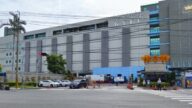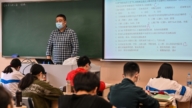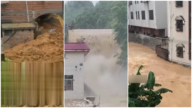【新唐人2011年4月26日訊】山東省濰坊市近期舉行公務員考試。媒體報導,不少考生沒怎麼準備,直接來「裸考」。不過在中國,「裸考」的另一個涵义,就是指考生沒有任何的「加分」。相較於當局開放各種管道為有錢人家的子女「合法加分」,普通人或窮人想讀好學校越來越難。
這個月24號,山東省濰坊市在14個考點同時舉行公務員考試。今年超過三萬五千人報考,預計招錄577個公務員。《齊魯晚報》報導,考生多半是應屆畢業生,有的已找到工作,但還是想考公務員。不少考生沒怎麼準備就上考場。有考生直言:他們就是「裸考」來了。
不過「裸考」的另一個涵义就是什麽加分都沒有的「普通考生」,只憑考試成績實力報考學校。而近年來高考盛行的「加分制」,在中國已成為保障權貴子女順利升學的「通道」。
台灣《商業週刊》四月的一篇報導指出,中國的考試制度越來越不公平,有錢有權就能加分,普通人或窮人想念好學校難如登天。以廣州巿為例,去年當局公布了一套所謂《高層次人才子女入學解決辦法》,凡是「高層次人才的子女」報考高中級學校,可以加十分。
但怎樣才算是「高層次人才」呢?今年(2011年)當局也公布了評選辦法,包括企業家、專家,和做出特殊貢獻的高技能人才、農村人才和社會工作人才等,就是他們選出的「高層次人才」。
「高層次人才」的子女參加考試一口氣可以加十分,在競爭激烈的中國差別非常大。2006年在北京,一位母親發現自己兒子班上近五十名考生中,居然有二十人考試成績可以加二十分,剩下的就是被輿論稱為「裸考」的考生。媒體諷刺中國的考試制度越來越腐敗。
《商周》報導指出,在中國,可能平均五十萬人,才能有一個人考上北京大學或北京清華大學,因此一分之差可能是好幾萬人,所以加十分、二十分的差別非常大。
輿論批評,當局如此大費周章,卻不是為了改革,而是把企業家、高幹變成「高層次人才」,再替他們的子女「合法」加分。廣州並不是唯一的特例。
據了解,中國教育部現行的加分規定有十四種,到了各省市又延伸出各種新辦法,最後十四種變成近兩百種。福建省甚至還有納稅三百萬元以上的,子女考試可以加二十分。也有花錢買國家級運動員或少數民族身份的,同樣可以加分。因此曾經鬧出,抽查運動員加分考生時發現,有所謂的「運動健將」跑百米速度卻比小學生還慢。
新唐人記者曾耀賢、李月綜合報導。
“Naked Exam Takers”?
On a recent civil service entrance exam in Weifang,
lots of students came “naked” (i.e. unprepared).
“Naked exam taker” has another meaning in China:
no extra points added for being privileged.
With more means devised to add points for the rich,
the ordinary students are more disadvantaged.
Local paper Qilu Evening News reported, on April 24,
over 35,000 students took the civil servant exam
in Weifang, Shandong, for only 577 vacancies.
Some were new graduates; some already started work.
A few of them said categorically: we came “naked”.
Taking the exam “naked” also means that
students have no privileges for extra points.
The prevailing points system only benefits the rich
and promotes academic careers of their offspring.
Taiwan Business Week reported in April that
China’s exam system has become increasingly unfair,
In Guangzhou, a scheme was announced in 2010
that the offspring of high-level personnel can have
10 extra points on their university entrance exams.
The definition of high-level personnel in 2011 is:
“entrepreneurs, special contributions’ technicians,
rural talents and social work personnel.”
Ten extra marks can be a huge advantage in China.
In 2006, a mother found that in her son’s class
20 out of 50 students were granted 20 extra points,
contrasting sharply with the rest “naked” ones.
In China, only one of 500,000 people can end up
in one of the elite universities.
So, even one extra point can make a huge difference,
let along dozens of points.
Authorities are criticized by the media for labeling
the rich and powerful “high-level personnel”,
so that their offspring can be privileged.
There are currently 14 ways to add extra points.
They are diversified further into some 200 ways
by the provincial and regional authorities.
In Fujian, families paying taxes over RMB3 million
can add 20 points to their children’s marks.
More ridiculously, some “point-privileged" athletes
were found to run slower than school pupils.
NTD reporters Zeng Yaoxian and Li Yue





























